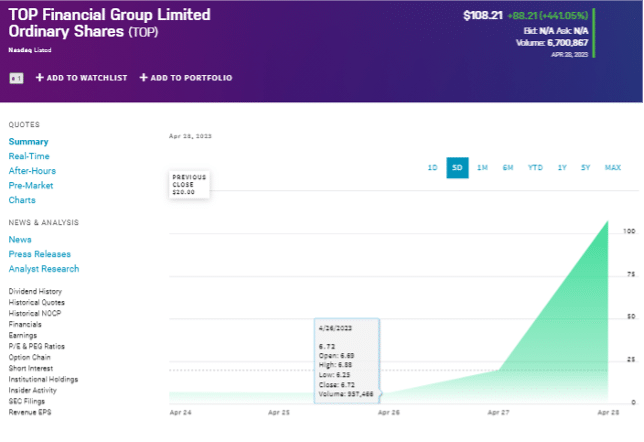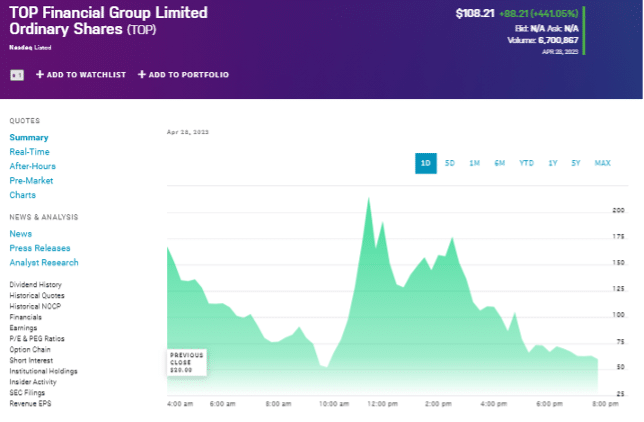Top Financial (NASDAQ: TOP) might well be the silliest of the recent market manias. There’s really nothing there to make it of interest. Well, nothing as interesting as people seem to think.

No, that’s just absurd, and here’s the intraday:

No, really, it’s absurd.
So what does Top Financial actually do?
Now it is possible for a stock to make this sort of price movement and for it to be sensible enough that it does. We think back to one pharma stock that suddenly, and surprisingly, got an FDA approval for a drug that was expected to fail (Cassava Sciences, $12 to $85 in early Feb 2021). But Top Financial is in fact a futures broker. Sure, it’s in Hong Kong and the Chinese are famously gambling mad. So is there something that could explain this?
No, really, there isn’t. As the company itself says: “Our Operating subsidiaries generate revenues primarily by charging commission fees on futures transactions at a flat rate for each futures transaction contract.“ And revenue – revenue, not profit – was about $5 million in the last reporting period. Unless Top Financial has just become larger than the markets it’s a broker in no, it just ain’t wroth the $3 billion that it closed at on Fri 28th. There’s not even the other revenue stream there. Some financial futures brokers also hold the margin. That allows them to profit from deploying that margin cash for their own account – or to lose it as MF Global did. But TOP’s not even doing that.
This is a pure financial market mania and it’s going to last about as long as those usually do – a few days at most. A small company, low float, some vague story that can be told – of a short interest (6.3% here) that could plausibly be squeezed. As someone starts buying then others climb aboard and it simply becomes a momentum trade. The problem with those being that we never know when the momentum’s going to fade – or the balloon pops and the stock goes back to its original and probably valid price.
The effect spills over to other Hong Kong financials
But these things do happen, and we’ve got to think about what to do when they do. In this case this also boosted all the other vaguely financial related small cap Hong Kong stocks. AMTD Digital (NASDAQ: HKD) and AMTD IDEA (NASDAQ: AMTD) moved a little bit but their own excitement is still too recent for anyone to really buy into those stories again so soon. HKD was, for a day or three, valued at more than Goldman Sachs and that was just absurd.
Yes, even Magic Empire
The other which seems to have been influenced was Magic Empire Global Limited (NASDAQ: MEGL) up 530% at one point. That had popped to $117 at its IPO then rapidly got to a more rational valuation at $12. Then spent the rest of the year reaching the 95 cents of early last week. There is absolutely nothing at all to explain the 500% and more rise other than that folk were getting excited about Hong Kong small cap financials.
An honourable mention as well to Dunxin (NYSE: DXF) which managed a 12 cents to 79 cents at one intraday point rise. Even if that doesn’t solve their problem of being below the $1 minimum bid price and thereby possibly about to lose their listing.
All great things to be on the right side of, of course. All absolute horrors if we end up buying at the top. Which clearly some people will be doing as a share cannot reach a top unless someone is buying it, can it?
So, what should we do about financial market manias?
The bigger question for us of course is what should we do about such manias? There the problem is acute. As traders of course we desire price volatility. But we do want to be on the right side of it. And if the volatility is purely because of some mania then how can we decide when the price change might differ in direction? When’s it going to top out? The most obvious trade is to try to go short as and when we think it has topped – but that’s going to be extraordinarily painful if we’re premature in when that peak has been reached.
The correct advice is simply that when we don’t know we shouldn’t trade. That’s boring, to be sure, but it is sensible. Anything else is gambling and while that’s fun the budget for having fun is and should be very different from how much we use for investments.